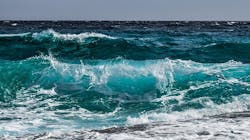DOE selects National Alliance for Water Innovation to lead Energy-Water Desalination Hub
WASHINGTON, DC, SEPT 30, 2019 -- U.S. Secretary of Energy Rick Perry announced the selection of the National Alliance for Water Innovation (NAWI) to lead a U.S. Department of Energy (DOE) Energy-Water Desalination Hub (Hub) that will address water security issues in the United States.
The Hub will focus on early-stage research and development (R&D) for energy-efficient and cost-competitive desalination technologies including manufacturing challenges. This suite of technologies will treat "non-traditional" water sources for multiple end-use applications. Congress appropriated a total of $40 million since Fiscal Year 2017 for the Hub and public and private stakeholders are expected to contribute $34 million in cost-share.
“I’m excited by the incredible possibilities we have focused on the energy-water nexus to create a secure and prosperous tomorrow, including the Energy-Water Desalination Hub,” said Secretary Perry. “The Hub will spur technological advancements in the treatment of non-traditional water sources. I’m proud that the Department of Energy is already a leader in this area, not simply in energy and water security, but in energy and water innovation.”
The NAWI is a public-private partnership with more than 35 members and over 180 organizations within the alliance, which is led by DOE's Lawrence Berkeley National Laboratory in collaboration with National Energy Technology Laboratory, National Renewable Energy Laboratory, and Oak Ridge National Laboratory.
The NAWI team will develop technologies that treat seawater, brackish water, and produced waters, for use in municipal, industrial, agricultural, utility, oil and gas, and other water supply needs. These technology advancements will help domestic suppliers of water desalination systems to manufacture critical components and parts—including the design and manufacture of small-modular and large-scale systems. NAWI's goal is to enable the manufacturing of energy-efficient desalination technologies in the United States at a lower cost with the same (or higher) quality and reduced environmental impact for 90% of non-traditional water sources within the next 10 years.
The Energy-Water Desalination Hub will support the Water Security Grand Challenge, a White House-initiated, DOE-led framework to advance transformational technology and innovation to meet the global need for safe, secure, and affordable water through a coordinated suite of prizes, competitions, and early stage R&D.
DOE also announced a plan to launch two prizes that are part of the Water Security Grand Challenge later this year:
Wastewater Resource Recovery Prize Competition.
The prize targets increasing resource recovery from small-to medium-sized municipal wastewater treatment plants through the development of multi-stakeholder systems-based solutions. Specifically, the competition will seek teams from wastewater treatment plants, engineering and design firms, technology developers, resource customers (e.g. farmers, electric and gas utilities) and others to develop innovative, holistic resource recovery plans for their respective wastewater treatment systems.
American-Made Challenges: Solar Desalination Prize.
This prize is a series of contests designed to accelerate technology innovation through the design, development, and demonstration of desalination systems that use solar power to generate fresh water from salt water. The fresh water produced can be used for agriculture, industry, and for drinking. The prize provides innovators a pathway from initial concept to technical design, to prototype to field-tested systems that provide clean, accessible water using solar as the primary energy source.
Globally, fresh water scarcity is a major humanitarian and economic challenge that impacts all sectors of society. DOE is also working with the U.S. Environmental Protection Agency, the U.S. Department of Interior, the U.S. Department of Agriculture, the U.S. Department of Homeland Security, the U.S. Department of Defense, the U.S. Agency for International Development, as well as the National Labs, the private sector, universities, and other organizations to pursue innovation to increase water reliability and quality.
